TV legend Norman Lear had heard it before.
“That face screams Irish!”
Lear was on the set of a new TV sitcom he was writing and producing, about a working-class family in Queens, New York.
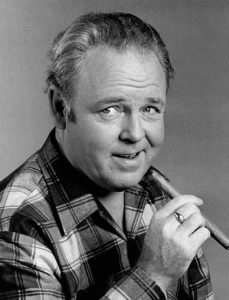
The star of the show – with the working title “All in the Family” – was a New York City-born Irish American actor named John Carroll O’Connor, who played a narrow-minded union guy named Archie Bunker.
“(The producers) saw that I possessed a singular insight into the motives and behavior of the character,” wrote O’Connor in his 2001 memoir, I Think I’m Outta Here.
“I knew the press would sanctimoniously attack us when they saw and heard a television character open fire on the blacks and Jews and Hispanics, but I didn’t want them to be able to say that the character….was a distortion of his counterpart in the real world.”
Also starring in this reworking of a British series called “Til Death Do Us Part” was Jean Stapleton as Archie’s long-suffering wife Edith, and Sally Struthers and Rob Reiner, as Archie’s daughter and son-in-law.
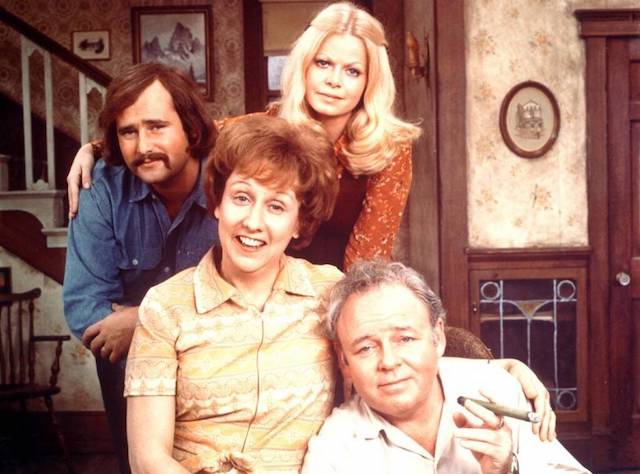
Photo: eonline.com
“All in the Family” was set to hit the airwaves in January 1971 – 50 years ago.
Up to then, Carroll O’Connor – like Lear, approaching 50 years old – had a busy career on stage and screen, albeit mainly in westerns and police procedurals, with the occasional role in whacky 1960s comedies like “Not With My Wife, You Don’t!”
O’Connor – who died in 2001 at the age of 76 – came of age with strong ties to Ireland.
He was a cousin of Irish playwright Ulick O’Connor, and the late Garrett O’Connor the renowned physician and psychiatrist, lauded for his work on addiction treatment (married to actor Fionnula Flanagan). The future Archie Bunker also worked regularly on the Dublin stage throughout the 1950s, while his younger brother Hugh attended medical school in Ireland. O’Connor himself completed a degree at University College Dublin, while his fiancée, Nancy Fields, studied at Trinity College.
The couple even got married in Dublin.
“Hugh and I became very close to my father’s family in Ireland,” O’Connor recalled in his memoir. “When we arrived there in the summer of 1950, we telephoned Dr. Matt O’Connor, who was my father’s first cousin. He greeted us familiarly as if he had always known us.”
When O’Connor returned to New York he even worked for a spell as a reporter at the Irish Advocate newspaper, published by members of his extended family.
Two decades later, though, O’Connor’s conspicuously Irish features were causing a problem.
Lear wanted to tell the story of a patriarch whose country seemed to be passing him by – a white Protestant World War II veteran both baffled and outraged by the 1960s. And the advancements of African Americans and women.
Not to mention all the Irish, Italians, and Jews living in his corner of New York City.
The trouble for Normal Lear in 1971 is that O’Connor not only was but looked like, a product of that very culture Archie Bunker seemed to despise.
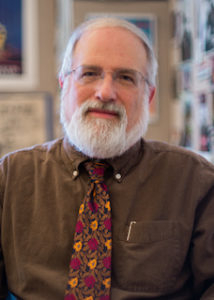
“Because of O’Connor’s dominant influence on the character,” it was hard to avoid the “major dimension of which (could) be read at face value,” Jim Cullen writes in an insightful new book called Those Were the Days: Why All in the Family Still Matters.
Cullen notes that lots of people were telling Lear that since O’Connor seemed so Irish, and Archie’s attitude was not uncommon among the ethnic Catholics of Queens by the 1970s, resistance was futile.
“Why fight it, use it!” Lear was told.
As Cullen told Irish America: “As portrayed by Carroll O’Connor, Archie Bunker is an essentially Irish character, even though Norman Lear determinedly avoided creating him that way.”
Cullen is among those who believe Archie’s anti-Irish Catholicism “is the least convincing part of his character,” he writes.
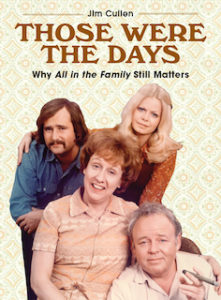 In his book, Cullen adds: “The idea of a TV show – a comedic television show no less – featuring a bitterly divided family arguing about politics and seriously engaging any manner of taboo subjects for weekly audiences of 50 million viewers for years at a time? There had never been anything like it…(and) there hasn’t been since either.”
In his book, Cullen adds: “The idea of a TV show – a comedic television show no less – featuring a bitterly divided family arguing about politics and seriously engaging any manner of taboo subjects for weekly audiences of 50 million viewers for years at a time? There had never been anything like it…(and) there hasn’t been since either.”
Not only was “All in the Family” enormously popular, it unleashed forces that even the likes of O’Connor and Lear did not expect.
Though ultimately loveable and funny, Archie was clearly the butt of many of the show’s jokes. Yet many viewers came to believe everything Archie said was right. They praised his nostalgia – even when it veered into bigotry. They cheered his patriotism – even if it excused the worst of American excesses.
As for Archie’s notorious reliance on stereotypes, well, it just seemed like he was more honest than others. Unafraid to tell it like it is.
Not unlike a certain other TV star who served as president up until recently.
“You don’t like the Irish?” a neighbor, Irene, asked Archie in one episode.
“They’re alright, when they’re not mumbling over their beads and boozing it up.”
Irene’s husband, Frank, was having none of this.
“I mumble over my beads (and) I’m Italian!”
Taken aback, Archie half apologizes, saying “I couldn’t tell.”
He adds: “Look Edith, we got a mixed marriage here.”
For author Jim Cullen, his own background helped him understand the various forces Lear and O’Connor were working with.
“I am of Irish extraction – I believe my family can be traced back to County Wicklow — and cherish that identity, as well as that of a practicing Catholic, both of which inform what I consider a certain skepticism I have of the Anglo-Protestant roots of the American progressive tradition,” Cullen told Irish America.
And five decades later, Cullen, for one, believes Archie and “All in the Family” still have important lessons to teach America.
“More candor is better than less,” Cullen writes. “This faith is at heart a democratic faith, and one that is now under active question on the left no less than on the right, where the notion that individuals can and should be trusted to make up their own minds is now regarded as naive at best and pernicious at worst.”
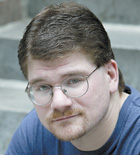
Tom Deignan is an author, teacher, and columnist for the Irish Voice and Irish America (tdeignan.blogspot.com).

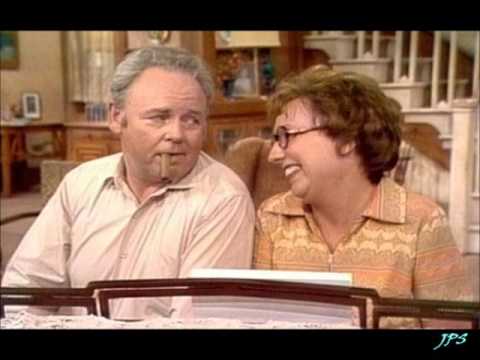
I had no idea about the Irish side and connections of this show….which stereotyped a family just like mine in Jersey City. My father Eugene Francis Regan was Archie, my mom was Edith and me Meathead. My father had Archies attitude, his chair, smoked cigars, drank cans of beer and hung out at the saloon. My mom was Edith and served my dad….always trying to draw out his nice slide. I went to undergrad for environmental studies and took the bluster of Archie.
And now I find the Irish angle too….thanks….
Dan Regan